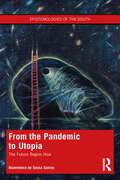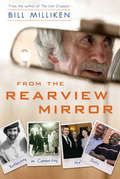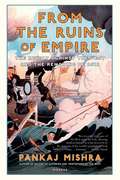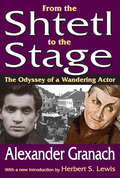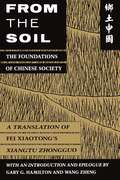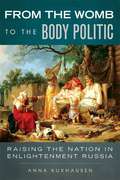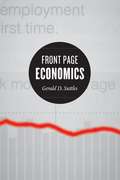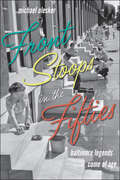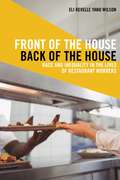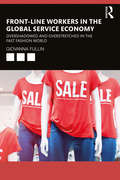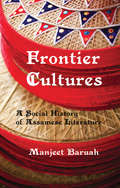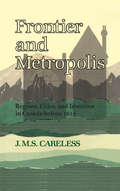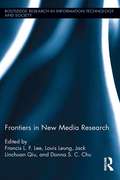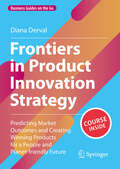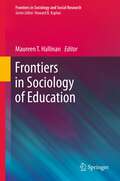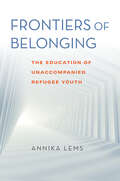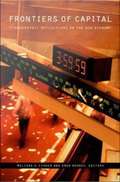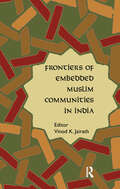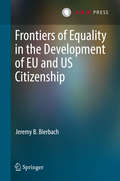- Table View
- List View
From the Pandemic to Utopia: The Future Begins Now (Epistemologies of the South)
by Boaventura de Sousa SantosThe coronavirus pandemic forces us to rethink our contemporaneity. It has brought to the surface dimensions of human fragility that partially contradict the euphoria and human hubris of the fourth industrial revolution (artificial intelligence). It has also aggravated the social inequality and racial discrimination that characterize our societies. The book argues that the virus, rather than an enemy, must be viewed as a pedagogue. It is trying to teach us that the deep causes of the pandemic lie in our dominant mode of production and consumption. The systemic overload of natural resources creates a metabolic rift between society and nature that destabilizes the habitat of wild animals and the vital cycles of natural regeneration whereby pandemics become an increasingly recurrent phenomenon. In trying to take seriously this lesson the book proposes a paradigmatic shift from the current civilizatory model to a new one guided by a more equitable relationship between nature and society and the priority of life, both human and non-human.
From the Peaceable to the Barbaric: Thorstein Veblen and the Charro Cowboy (Classical and Contemporary Social Theory)
by Beatriz Aldana MarquezThis book applies Thorstein Veblen’s cultural theory to a qualitative study of the charro cowboy culture and community in Mexico. Drawing on Veblen’s arguments regarding cultural lag, the peaceable and the barbaric, predatory culture, vested interest, and pecuniary interest, it examines the comportment, clothing, mannerisms, and adherence to the norms that are unique to this subculture, while considering the cultural changes within race, class, and gender dynamics of this community in relation to mainstream Mexico. With close attention to the impact of business principles and standardization on the charro, leading to changes in practices and social interactions, the author considers generational differences and the tensions that exist between newer and older charros as a result of the developing emphasis on business. A close study of the nature of cultural adaptability and the persistence of inequality regardless of mainstream illusions of equality, this volume sheds new light on our understanding of what culture is rather than what culture does, while reintroducing the neglected ethnographic streak in Veblen’s work as an important methodological and theoretical tool in the interpretation of culture.
From the Ptolemies to the Romans
by Andrew MonsonThis book gives a structured account of Egypt's transition from Ptolemaic to Roman rule by identifying key relationships between ecology, land tenure, taxation, administration and politics. It introduces theoretical perspectives from the social sciences and subjects them to empirical scrutiny using data from Greek and Demotic papyri as well as comparative evidence. Although building on recent scholarship, it offers some provocative arguments that challenge prevailing views. For example, patterns of land ownership are linked to population density and are seen as one aspect of continuity between the Ptolemaic and Roman period. Fiscal reform, by contrast, emerges as a significant mechanism of change not only in the agrarian economy but also in the administrative system and the whole social structure. Anyone seeking to understand the impact of Roman rule in the Hellenistic east must consider the well-attested processes in Egypt that this book seeks to explain.
From the Rearview Mirror: Reflecting On Connecting The Dots
by Bill MillikenFrom the Rearview Mirror is the story of Bill Milliken’s journey from an affluent Pittsburgh suburb to the streets of Harlem and the Lower East Side of New York City in the 1960s, on to communal living in Georgia in the 1970s, to working with multiple presidential administrations in Washington, D.C. He struggled with an undiagnosed learning disability in school, believing he was dumb and had nowhere to go. After connecting with the Young Life outreach program at the age of 17, however, he found his calling doing street work with homeless, addicted, and other at-risk teens in the turbulent ’60s. Bill and his colleagues founded what grew into Communities in Schools, a highly effective organization working to bring services to young people and prevent them from dropping out of school. Along the way, Bill struggled with bringing his personal life into alignment with his ideals, coming to terms with organized religion and his own spiritual path, and creating the family and community he’d always longed for.
From the Ruins of Empire: The Revolt Against the West and the Remaking of Asia
by Pankaj MishraA little more than a century ago, independent thinkers across Asia sought to frame a distinct intellectual tradition that would inspire the continent's rise to dominance. Yet this did not come to pass, and today those thinkers--Tagore, Gandhi, and later Nehru in India; Liang Qichao and Sun Yat-sen in China; Jamal al-Din al-Afghani and Abdurreshi al Ibrahim of the Ottoman Empire--are seen as outsiders within the main anticolonial tradition. But as Pankaj Mishra demonstrates in this enthralling portrait of like minds, Asia's revolt against the West is not the one led by faith-fired terrorists and thwarted peasants; rather, it is rooted in the ideas of these once renowned intellectuals. Now, when the ascendency of Asia seems possible as never before, From the Ruins of Empire is as necessary as it is timely--a book indispensable to our understanding of the world and our place in it.
From the Shtetl to the Stage: The Odyssey of a Wandering Actor
by Alexander GranachAlexander Granach, who died while he was acting on Broadway in 1945, brilliantly relates the remarkable story of his unlikely path from a poverty-stricken, rough-and-tumble childhood to success on the German stage. This is the account of a daring, curiosity-filled, and perceptive Jewish child from poor towns in Galicia who was seized with a passion for the theater when he saw his first show at the age of 14. He overcame great odds to become a leading stage and film actor in Weimar Germany - and he had to have both legs broken to do it! Born in what is now southern Ukraine, Granach began working at the age of six in his father's bakery, where his heavy tasks left him visibly knock-kneed. With very little formal education but open for adventure and willing to work hard, Alexander ran away several times, the last time to Berlin, at the age of 16, where his talent and charm won him a place in Max Reinhardt's theater school. His career was abruptly interrupted by World War I and his time as a prisoner of war in Italy, but after a daring escape and the end of the war he resumed his rise to prominence in German artistic life. A natural storyteller, Granach's autobiography captures equally the charms, adventures, and trials of his shtetl days, the horrors of trench warfare, and the glamour and excitement of the German theater before Hitler came to power.
From the Soil
by Xiaotong Fei Wang Zheng Gary G. HamiltonThis classic text by Fei Xiaotong, China's finest social scientist, was first published in 1947 and is Fei's chief theoretical statement about the distinctive characteristics of Chinese society. Written in Chinese from a Chinese point of view for a Chinese audience, From the Soil describes the contrasting organizational principles of Chinese and Western societies, thereby conveying the essential features of both. Fei shows how these unique features reflect and are reflected in the moral and ethical characters of people in these societies. This profound, challenging book is both succinct and accessible. In its first complete English-language edition, it is likely to have a wide impact on Western social theorists. Gary G. Hamilton and Wang Zheng's translation captures Fei's jargonless, straightforward style of writing. Their introduction describes Fei's education and career as a sociologist, the fate of his writings on and off the Mainland, and the sociological significance of his analysis. The translators' epilogue highlights the social reforms for China that Fei drew from his analysis and advocated in a companion text written in the same period.
From the War on Poverty to the War on Crime: The Making of Mass Incarceration in America
by Elizabeth HintonHow did the land of the free become the home of the world's largest prison system? Elizabeth Hinton traces the rise of mass incarceration to an ironic source: not the War on Drugs of the Reagan administration but the War on Crime that began during Johnson's Great Society at the height of the civil rights era.
From the Womb to the Body Politic: Raising the Nation in Enlightenment Russia
by Anna KuxhausenIn Russia during the second half of the eighteenth century, a public conversation emerged that altered perceptions of pregnancy, birth, and early childhood. Children began to be viewed as a national resource, and childbirth heralded new members of the body politic. The exclusively female world of mothers, midwives, and nannies came under the scrutiny of male physicians, state institutions, a host of zealous reformers, and even Empress Catherine the Great. Making innovative use of obstetrical manuals,belles lettres, children's primers, and other primary documents from the era, Anna Kuxhausen draws together many discourses-medical, pedagogical, and political-to show the scope and audacity of new notions about childrearing. Reformers aimed to teach women to care for the bodies of pregnant mothers, infants, and children according to medical standards of the Enlightenment. Kuxhausen reveals both their optimism and their sometimes fatal blind spots in matters of implementation. In examining the implication of women in public, even political, roles as agents of state-building and the civilizing process,From the Womb to the Body Politicoffers a nuanced, expanded view of the Enlightenment in Russia and the ways in which Russians imagined their nation while constructing notions of childhood.
Front Page Economics
by Gerald D. Suttles Mark D. JacobsIn an age when pundits constantly decry overt political bias in the media, we have naturally become skeptical of the news. But the bluntness of such critiques masks the highly sophisticated ways in which the media frame important stories. In Front Page Economics, Gerald Suttles delves deep into the archives to examine coverage of two major economic crashes—in 1929 and 1987—in order to systematically break down the way newspapers normalize crises. Poring over the articles generated by the crashes—as well as the people in them, the writers who wrote them, and the cartoons that ran alongside them—Suttles uncovers dramatic changes between the ways the first and second crashes were reported. In the intervening half-century, an entire new economic language had arisen and the practice of business journalism had been completely altered. Both of these transformations, Suttles demonstrates, allowed journalists to describe the 1987 crash in a vocabulary that was normal and familiar to readers, rendering it routine. A subtle and probing look at how ideologies are packaged and transmitted to the casual newspaper reader, Front Page Economics brims with important insights that shed light on our own economically tumultuous times.
Front Stoops in the Fifties: Baltimore Legends Come of Age
by Michael OleskerThis personal history of prominent Baltimoreans sheds light on the social transformations already taking place in the supposedly innocent 1950s. Front Stoops in the Fifties recounts the stories of some of Baltimore&’s most famous personalities as they grew up during the &“decade of conformity&”—just before they entered the turbulent 1960s. Focusing on the period before JFK&’s assassination, Olesker looks to individuals who would go on to influence the brewing cultural revolution. Such familiar names as Jerry Leiber, Nancy Pelosi, Thurgood Marshall, and Barry Levinson figure prominently in Michael Olesker&’s fascinating account, which draws on personal interviews and journalistic research. Olesker tells the story of Nancy D&’Alesandro Pelosi, daughter of the mayor, who grew up in a political home and eventually became the first woman Speaker of the House. Thurgood Marshall, schooled in a racially segregated classroom, went on to argue Brown v. Board of Education of Topeka before the U.S. Supreme Court and rewrite race-relations law. These and many other stories come to life in Front Stoops in the Fifties. &“[A] fascinating read . . . The shocking part is just how relevant these stories remain today.&” —Baltimore Post-Examiner &“[A] crisp, insightful dispatch from a skilled writer who knows his city and its history.&” —David Simon, executive producer of HBO&’s The Wire
Front of the House, Back of the House: Race and Inequality in the Lives of Restaurant Workers (Latina/o Sociology #10)
by Eli Revelle WilsonHonorable Mention, Mirra Komarovsky Book Award, given by the Eastern Sociological Society2021 Outstanding Academic Title, Choice MagazineHow workers navigate race, gender, and class in the food service industryTwo unequal worlds of work exist within the upscale restaurant scene of Los Angeles. White, college-educated servers operate in the front of the house—also known as the public areas of the restaurant—while Latino immigrants toil in the back of the house and out of customer view.In Front of the House, Back of the House, Eli Revelle Yano Wilson shows us what keeps these workers apart, exploring race, class, and gender inequalities in the food service industry.Drawing on research at three different high-end restaurants in Los Angeles, Wilson highlights why these inequalities persist in the twenty-first century, pointing to discriminatory hiring and supervisory practices that ultimately grant educated whites access to the most desirable positions. Additionally, he shows us how workers navigate these inequalities under the same roof, making sense of their jobs, their identities, and each other in a world that reinforces their separateness. Front of the House, Back of the House takes us behind the scenes of the food service industry, providing a window into the unequal lives of white and Latino restaurant workers.
Front-Line Workers in the Global Service Economy: Overshadowed and Overstretched in the Fast Fashion World
by Giovanna FullinWalking around the commercial streets of New York, San Francisco, Milan, London, or Paris and looking at the succession of multinational chain stores’ windows, you can easily forget what country you are in. However, if you hear the small talk among the employees, you hear very different stories. In New York, a 30-year-old woman is worried because she does not know if she will work enough hours to make a living the following week—whereas, in Milan, a mother of the same age knows she will work 20 hours a week but is concerned about whether her contract will be renewed at the end of the following month. Following three years of fieldwork, which included 100 in-depth interviews with front-line retail workers and unionists in New York City and Milan, Front-Line Workers in the Global Service Economy investigates both the lived experiences of salespersons in the "fast fashion" industry—a retail sector made of large chains of stores selling fashion garments at low prices—and the possibilities of collective action and structured forms of resistance to these global trends. In the face of economic globalization and vigorous managerial efforts to minimize labor costs and to standardize the retail experience, mass fashion workers’ stories tell us how strong the pressure toward work devaluation in low-skilled service sectors can be, and how devastating its effects are on the workers themselves.
Frontier Cultures: A Social History of Assamese Literature
by Manjeet BaruahThe study of Assamese literature has so far been in terms of the history of the Assamese language. This book is a history of the narratives written in Assamese language and its relation to the process of region formation. The literature dealt with ranges from pre-colonial chronicles, ballads and drama to modern genres of fiction and critical writing in Assamese language. Taking the Brahmaputra valley and Assamese literature as case studies, the author attempts to link literature, its nature and use, to processes of region formation, arguing that such a study needs to take the context of historical geography into consideration. The book views region formation in north-east India as a dialectical process, that is, the dialectic between the shared and the distinct in inter-group and community relations. It borrows an anthropological approach to study written narratives and cultures so as to locate such narratives in specific processes of region formation.
Frontier Research in Behavioral Public Administration
by Zhixia ChenThis book mainly summarizes and analyzes the advanced research progress in the field of behavioral public administration, and also looks forward to the future of related academic research. It helps readers to quickly grasp the frontiers and latest developments in the field of behavioral public administration. It is benefit for readers to learn the hot topics, issues, and research methods, improving their research ability. It not only includes the frontier progress in western culture but also includes the researches in China.
Frontier and Metropolis: Regions, Cities, and Identities in Canada before 1914
by J.M.S. CarelessThe regional character of Canada and the crucial role of metropolitan development in its history have been recurring themes in the work of J.M.S. Careless. In these essays he returns to those themes, discussing how national and regional identity in Canada show vital links with metropolitan-hinterland relationship across time and space.The first essay presents an overall appraisal of the historic connections between metropolitan centres and frontiers or regions in Canada. These connections might be manifested in economic structures, political fabrics, or social networks, and also in modes of opinion and popular images and traditions. The second part of the book inquires into some major conceptual treatments given to frontier and metropolis in history. The third seeks to evaluate the impact of metropolitanism on distinctive features of identity that are revealed in Canadian historical experience. A fourth essays rounds out the volume by discussing the influence of external metropolanism in Canada.Careless endows his subject with the combined fornce of his own continuing research, his sensitivity to the new historical scholarship, and the lively and penetrating mind that have made him one of Canada's leading historians for more than thirty years.
Frontiers in New Media Research (Routledge Research in Information Technology and Society)
by Francis L. F. Lee Louis Leung Donna S. C. Chu Jack L. QiuThis volume puts together the works of a group of distinguished scholars and active researchers in the field of media and communication studies to reflect upon the past, present, and future of new media research. The chapters examine the implications of new media technologies on everyday life, existing social institutions, and the society at large at various levels of analysis. Macro-level analyses of changing techno-social formation – such as discussions of the rise of surveillance society and the "fifth estate" – are combined with studies on concrete and specific new media phenomena, such as the rise of Pro-Am collaboration and "fan labor" online. In the process, prominent concepts in the field of new media studies, such as social capital, displacement, and convergence, are critically examined, while new theoretical perspectives are proposed and explicated. Reflecting the inter-disciplinary nature of the field of new media studies and communication research in general, the chapters interrogate into the problematic through a range of theoretical and methodological approaches. The book should offer students and researchers who are interested in the social impact of new media both critical reviews of the existing literature and inspirations for developing new research questions.
Frontiers in New Media Research: Frontiers In New Media Research (Routledge Research in Information Technology and Society #15)
by Francis L. F. Lee Louis Leung Donna S. C. Chu Jack L. QiuThis volume puts together the works of a group of distinguished scholars and active researchers in the field of media and communication studies to reflect upon the past, present, and future of new media research. The chapters examine the implications of new media technologies on everyday life, existing social institutions, and the society at large at various levels of analysis. Macro-level analyses of changing techno-social formation – such as discussions of the rise of surveillance society and the "fifth estate" – are combined with studies on concrete and specific new media phenomena, such as the rise of Pro-Am collaboration and "fan labor" online. In the process, prominent concepts in the field of new media studies, such as social capital, displacement, and convergence, are critically examined, while new theoretical perspectives are proposed and explicated. Reflecting the inter-disciplinary nature of the field of new media studies and communication research in general, the chapters interrogate into the problematic through a range of theoretical and methodological approaches. The book should offer students and researchers who are interested in the social impact of new media both critical reviews of the existing literature and inspirations for developing new research questions.
Frontiers in Product Innovation Strategy: Predicting Market Outcomes and Creating Winning Products for a People and Planet-friendly Future (Business Guides on the Go)
by Diana DervalThe book shares a cutting-edge approach to innovation strategies and product innovation by showing how advances in management and science can now help explain and predict innovation response and market outcomes across industries (health, cosmetics, food, leisure, insurance, automotive). A comprehensive review of the latest breakthroughs - from behavioral science to sustainable practices - sheds a new light on product innovation management allowing brands and teams to develop daring yet low-risk innovation strategies, while increasing their positive impact on people and planet.Readers will particularly benefit from the self-paced online video-based learning modules provided with the innovative Book+Course format.
Frontiers in Sociology of Education
by Maureen T. HallinanScholarly analysis in the sociology of education has burgeoned in recent decades. Frontiers in Sociology of Education aims to provide a roadmap for sociologists and other social scientists as they set bold new directions for future research on schools. In Part 1 of this forward-looking volume, the authors present cutting-edge research to set new guidelines for the sociological analysis of schools. In Part 2, notable social scientists, historians, administrators and educators provide a wide-ranging array of perspectives on contemporary education to insure that scholars make creative and broadly informed contributions to the sociological analysis of schools. The contributors to this volume examine events currently influencing education including: globalization, expansion of educational access, the changing significance of religion, new family structures, and curriculum reform. Frontiers in Sociology of Education offers an innovative collection of research and ideas aimed at inspiring new analyses of schools better linked to changing societal conditions.
Frontiers in Time Research – Einführung in die interdisziplinäre Zeitforschung
by Elisabeth Schilling Maggie O’NeillIn diesem Buch werden verschiedene Facetten gegenwärtiger zeitbezogener Sozialforschung beleuchtet: biografische Zeitverarbeitung, Zeitumgang und Zeiterleben in und um Bildungseinrichtungen, Innovationen in arbeitsorganisationalen Prozessen und methodologische Fragen der Zeiterforschung. Es ist ein interdisziplinäres Werk mit soziologischen, psychologischen, pädagogischen, philosophischen und wirtschaftswissenschaftlichen Ansätzen zu neuen Perspektiven der Zeiterforschung.This book discusses various facets of current time-related social research: past related biographical research; present related research on time focusing upon the educational system, future-oriented innovations in working and organizational processes as well as methodological questions of time research. It is an interdisciplinary opus that includes sociological, psychological, educational, philosophical and economic approaches to frontiers in time research.
Frontiers of Belonging: The Education of Unaccompanied Refugee Youth (Worlds in Crisis: Refugees, Asylum, and Forced Migration)
by Annika LemsAs unprecedented numbers of unaccompanied African minors requested asylum in Europe in 2015, Annika Lems witnessed a peculiar dynamic: despite inclusionary language in official policy and broader society, these children faced a deluge of exclusionary practices in the classroom and beyond. Frontiers of Belonging traces the educational paths of refugee youth arriving in Switzerland amid the shifting sociopolitical terrain of the refugee crisis and the underlying hierarchies of deservingness. Lems reveals how these minors sought protection and support, especially in educational settings, but were instead treated as threats to the economic and cultural integrity of Switzerland. Each chapter highlights a specific child's story—Jamila, Meron, Samuel, and more—as they found themselves left out, while on paper being allowed "in." The result is a highly ambiguous social reality for young refugees, resulting in stressful, existential balancing acts. A captivating ethnography, Frontiers of Belonging allows readers into the Swiss classrooms where unspoken distinctions between self and other, guest and host, refugee and resident, were formed, policed, and challenged.
Frontiers of Capital: Ethnographic Reflections on the New Economy
by Greg Downey Melissa S. FisherWith the NASDAQ having lost 70 percent of its value, the giddy, optimistic belief in perpetual growth that accompanied the economic boom of the 1990s had fizzled by 2002. Yet the advances in information and communication technology, management and production techniques, and global integration that spurred the "New Economy" of the 1990s had triggered profound and lasting changes. Frontiers of Capital brings together ethnographies exploring how cultural practices and social relations have been altered by the radical economic and technological innovations of the New Economy. The contributors, most of whom are anthropologists, investigate changes in the practices and interactions of futures traders, Chinese entrepreneurs, residents of French housing projects, women working on Wall Street, cable television programmers, and others. Some contributors highlight how expedited flows of information allow business professionals to develop new knowledge practices. They analyze dynamics ranging from the decision-making processes of the Federal Reserve Board to the legal maneuvering necessary to buttress a nascent Japanese market in over-the-counter derivatives. Others focus on the social consequences of globalization and new modes of communication, evaluating the introduction of new information technologies into African communities and the collaborative practices of open-source computer programmers. Together the essays suggest that social relations, rather than becoming less relevant in the high-tech age, have become more important than ever. This finding dovetails with the thinking of many corporations, which increasingly employ anthropologists to study and explain the "local" cultural practices of their own workers and consumers. Frontiers of Capital signals the wide-ranging role of anthropology in explaining the social and cultural contours of the New Economy. Contributors. Jean Comaroff, John L. Comaroff, Greg Downey, Melissa S. Fisher, Douglas R. Holmes, George E. Marcus, Siobhn O'Mahony, Aihwa Ong, Annelise Riles, Saskia Sassen, Paul A. Silverstein, AbdouMaliq Simone, Neil Smith, Caitlin Zaloom
Frontiers of Embedded Muslim Communities in India
by Vinod K. JairathThis volume approaches the study of Muslim societies through an evolutionary lens, challenging Islamic traditions, identities, communities, beliefs, practices and ideologies as static, frozen or unchangeable. It assumes that there is neither a monolithic, essential or authentic Islam, nor a homogeneous Muslim community. Similarly, there are no fixed binary oppositions such as between the ulama and sufi saints or textual and lived Islam. The overarching perspective — that there is no fixity in the meanings of Islamic symbols and that the language of Islam can be used by individuals, organizations, movements and political parties variously in religious and non-religious contexts — underlies the ethnographically rich essays that comprise this volume. Divided in three parts, the volume cumulatively presents an initial framework for the study of Muslim communities in India embedded in different regional and local contexts. The first part focuses on ethnographies of three Muslim communities (Kuchchhi Jatt, Irani Shia and Sidis) and their relationships with others, with shifting borders and frontiers; part two examines the issue of ‘caste’ of certain Muslim communities; and the third part, containing chapters on Tamil Nadu, Andhra Pradesh, Mumbai and Gujarat, looks at the varied responses of Muslims as Indian citizens in regional contexts at different historical moments. Although the volume focuses on Muslim communities in India, it is also meant to bridge an important gap in, and contribute to, the ‘sociology of India’ which has been organized and taught primarily as a sociology of Hindu society. The book will appeal to those in sociology, history, political science, education, modern South Asian Studies, and to the general reader interested in India & South Asia.
Frontiers of Equality in the Development of EU and US Citizenship
by Jeremy B. BierbachThis book provides a framework for comparing EU citizenship and US citizenship as standards of equality. If we wish to understand the legal development of the citizenship of the European Union and its relationship to the nationalities of the member states, it is helpful to examine the history of United States citizenship and, in particular, to elaborate a theory of 'duplex' citizenships found in federal orders. In such a citizenship, each person's citizenship is necessarily 'layered' with the citizenship or nationality of a (member) state. The question this book answers is: how does federal citizenship, as a claim to equality, affect the relationship between the (member) state and its national or citizen? Because the book places equality, not allegiance to a sovereign at the center of its analysis of citizenship, it manages to escape traditional analyses of the EU that measure it by the standard of a sovereign state. The text presents a coherent account of the development of EU citizenship and EU civil rights for those who wish to understand its continuing development in the case law of the Court of Justice of the European Union. Scholars and legal practitioners of EU law will find novel insights in this book into how EU citizenship works, in order to be able to grasp the direction in which it will continue to develop. And it may be of great interest to American scholars of law and political science who wish to understand one aspect of how the EU works as a constitutional order, not merely as an order of international law, by comparison to their own history. Jeremy Bierbach is an attorney at Franssen Advocaten in Amsterdam. He holds a Ph. D. in European constitutional law from the University of Amsterdam, the Netherlands.
